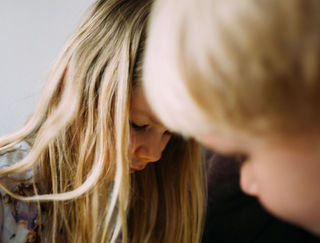
Depression
Why I Won't Be Showing My Children Sad Movies This Year
Please don't elicit our children's fears with your flicks.
Posted January 17, 2016

With President Obama’s recent address to the nation, he meant to reassure us that our government is finding ways to smoke out home-grown terrorists as it partners with other countries to deal with terrorism globally. But, as a parent, instead of calming me, his speech made me more nervous.
With every clip on the evening news, we are privy to reports of lone-wolf attacks, premeditated violence, and suffering. We live in America, "the Home of the Free and the Brave," yet if I were to poll most of the parents I know, I’m sure I’d discover, as the New York Times recently did, that we don’t feel very much of either right now.
When the new normal is going to a mall or a movie and checking the exits in case of an active shooter situation, or reading more insight into the murderous actions of a radicalized new mom (lauded by ISIS for being a good soldier), we know that like Alice in Wonderland, we have crossed through the Looking Glass into a reality we never expected to find. Like it or not, we’re all living in a war zone (even if just in our minds).
So why not take our kids to a matinee where they (and we) can inhabit a fantasy world? It seemed like a good idea to me...until I saw that it wasn’t.
I recently took my daughter to see the recently released Pixar/Disney film The Good Dinosaur, a computer-animated adventure (which used to be known as a cartoon). It is rated PG, but so is Frozen (and my daughter loves that movie). At first glance, I thought the film was beautifully animated with a relatable main character, the young dinosaur Arlo, and his human, but dog-like sidekick Spot, a Paleolithic child who has lost his family. Settling in for a 3-D experience of a coming of age story, I was shocked to see these scenarios: death of a beloved parent, a paean to the allure of drug-induced hallucinating from eating fermented fruit, predatory creatures, and the violence of nature in the form of landslides, hurricanes, and lightning, all of which gave me pause that I’d made the right decision to take my child. I was further disheartened to find my six-year-old in tears halfway through the movie, the liquid drops of her sorrow sliding down underneath her thick-rimmed viewing glasses.
What were the filmmakers thinking in making this emotional tsunami of a movie and promoting it to young kids? I love most Disney films, but why do they feel the need to start each of their recent films (looking at you Cinderella) with death scenes that create havoc from the howling of the young, traumatized moviegoers. A small child secure in her parent or guardian’s love, should never see a prolonged, intense scene of a man, mouse, girl, or dinosaur losing a parent—and in this case, being responsible for a parent’s death—without a trigger warning and notes for discussion.
Watching my daughter repeatedly sob, “Daddy, he lost his daddy,” while I stroked her shoulders and said, “I know sweetie. I know,” broke my heart. The father doesn't even die for a good reason. He perishes pushing his son to be brave by going out into the wilderness in the midst of a storm. The filmmakers then cruelly bring him back in a dream sequence only to have him dissipate.
Lest you think that my child is too sensitive, let me tell you, my daughter is hard to ruffle. She doesn't flinch at Harry Potter's headless ghosts swarming around Hogwarts, and she didn't blink an eye at Baymax’s sacrifice during Big Hero 6, or when Optimus Prime died in the Transformers movie. She sadly watched the death of Mufasa in the Lion King, but quickly recovered, buoyed by the film’s lighthearted scenes and sing-along musical numbers.
If the idea is to tell our kids, “Buck up, it’s a tough world out there,” I think that’s the wrong message. Our kids will learn that all too soon. In the meantime, any movie that has a high level of intensity when it comes to death scenes, bullying, loneliness, violence, and assorted maelstroms should be considered unsuitable for young ones.
I hate the feeling of being manipulated to tears and fight it at every turn, but children are the most susceptible. So here’s my plea to filmmakers: Please don’t elicit our children’s fears with your flicks. While I don’t have a problem with my daughter's crying to show empathy (she tears up at the commercials with the sad dogs up for adoption and asks if we can donate money to help them), I do have a problem with her being subjected to harsh realities when she is just going to the movies for an entertaining escape.
Going forward I’ll also be checking sites like Common Sense Media and Parent Previews before heading out for a fun afternoon at the movies. And I’ll plan to take her to the violence- and trauma-free film about Charlie Brown, The Peanuts Movie, and Alvin and the Chipmunks: The Road Chip.
For now, let’s at least agree to keep the movies safe for our youngest, most innocent children. In a world where weekly school safety drills have become a necessity, shielding our kids from unnecessary pain or fear about the harsh realities of life today is perhaps the best New Year’s resolution we can still make.
This article originally appeared on Ravishly.com



